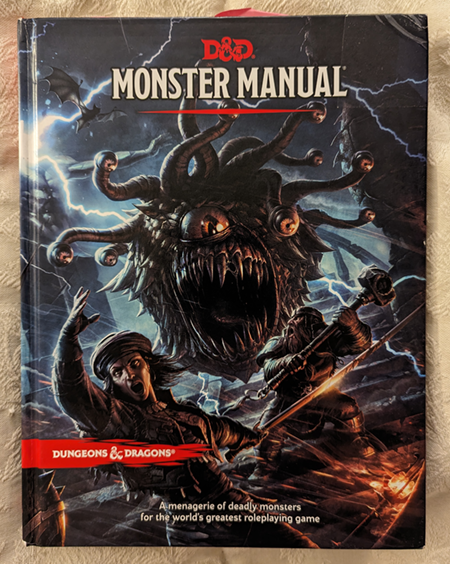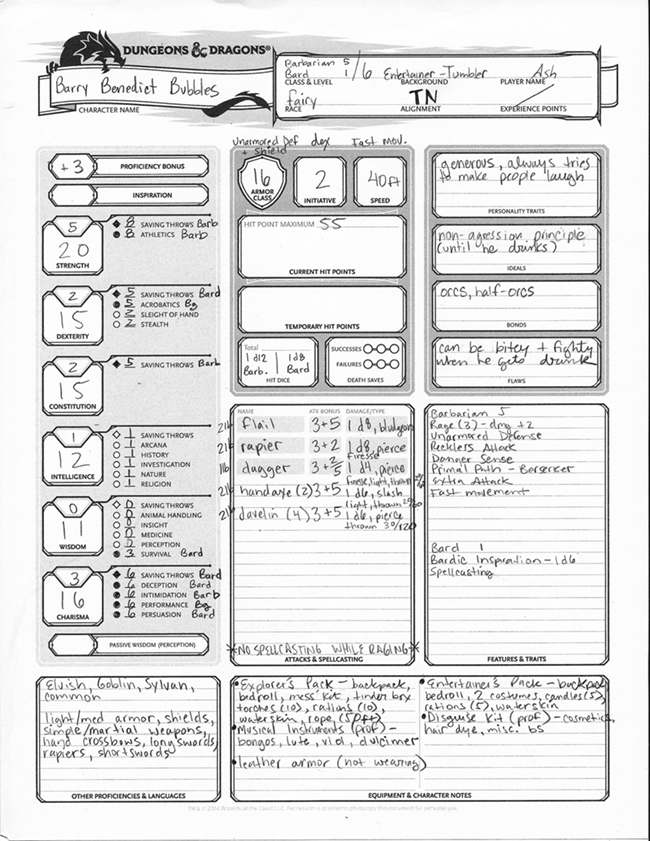Your Character
To play DnD, you first want to make a character. Secondly, you'd have to build this character.
You'll want to keep track of your character's info while playing on a "character sheet", especially your health
(there's a place for that on the sheet). The following are usually recommended,
if not required on a your character sheet, plus anything else you'd want to keep track of:
It takes a little while to get the hang of character building especially learning how the skills work, but once you've got the hang of it, it can be addicting! Like writing characters in your own story, it can get fun just to build them even if you don't ever play with them.
Although not required, when building a character's personality, which in turn will have an influence on their actions, you can choose to assign your character a moral alignment from the 9 DnD alignments (since 1977). In fact, monsters themselves have assigned alignments to them as well.
The 3.5 edition Player's Handbook provided archetype examples of each alignment:
Your Dungeon Master (DM)
can also be referred to as "Game Master" (GM)The DM is the main story-teller who puts forth the situations your character has to experience.There are countless ways to play your character, but they revolve around set rules. Any rule bending or breaking is up to your Dungeon Master (DM). As far as leveling up, some DMs will have you level up your character at specific milestones in the progression of the campaign they're running and others will have your character collect experience points, reaching the milestone at a certain amount of experience points to level up.
The DM can either design an original story adventure for a campaign or use one of the many pre-made adventures ("modules") that have already been published.
Magic
As you can imagine, magic has been used in DnD since the very begaining but like almost everything in the game's history, it has had its changes/upgrades.
Not every class in DnD actually casts spells, the classes that do are considered a spellcasting class. A Fighter, as you can imagine isn't by default a spellcasting class (see multiclassing), but the Wizard is. These spellcasting classes get their magic from different sources such as studying the arcane arts, drawing them from a magical source, or being gifted them from a higher diety.
There are also rules for casting spells specific to the spellcasting class as well. For example, after a "long rest", a character that uses "prepared" spells (Cleric, Druid, Paladin, Wizard) can choose any spells (in the amount allowed) they want from their class' list of spells, they just have to "prepare" this list of spells for the new day. A character that uses "known" spells, simply chooses to use their spells from the list of spells that are available to them. They aren't capable of pulling whatever spells they want from their class' list of spells. Players will get the opportunity to swap any of these spells upon leveling up.
This system of prepared vs known spells is an attempt to keep the magic power of the characters and ultimately the game in balance. A Wizard studies in the magical arts for years to learn his abilities and as explained above, can choose from any of their spells, a total of 200. At level 20 a Wizard can prepare up to 44 of those spells a day. Where as a Warlock makes a pact with an otherworldly being and is bestowed their magic. At level 20 their "known" spells tap out at 15 a day.
There are also different spell types called "schools". These are abjuration, alteration, conjuration, divination, enchantment, illusion, invocation, and necromancy. Each spell in and of themselves also requires the spellcaster to do, say, or use something in order for the spell to work. For example, this is the spell Fireball:
FIREBALL
3rd-level evocation
Range: 150 feet
Components: V, S, M (a tiny ball of bat guano and sulfur)
Duration: Instantaneous
A bright streak flashes from your pointing finger to a point you choose within range and then blossoms with
a low roar into an explosion of flame. Each creature in a 20-foot-radius sphere centered on that point must
make a Dexterity saving throw. A target takes 8d6 fire damage on a failed save, or half as much damage on a
successful one. The fire spreads around corners. It ignites flammable objects in the area that aren't being worn
or carried.
At Higher Levels. When you cast this spell using a spell slot of 4th level or higher, the damage
increases by 1d6 for each slot level above 3rd.
For more info on the how-tos and anything else spell related check out DnDBeyond's Spellcasting page.
The History
Dungeons & Dragons (DnD) is a co-operative, tabletop role-playing game or more commonly referred to as a "TTRPG". Originally designed by Gary Gygax and Dave Arneson in 1974, this game is still going strong. It's undeniable how many movies, video games, board games, and more have been influenced by DnD. DnD itself has handbooks, gaming supplies, magazines, animations, movies, video games, cards, fiction book series, comics, toys, and even a music soundtrack.

Put as simply as possible: it's a storytelling game in which you create a "character", play with other people and their characters in a world with problems to solve, monsters to slay, and more tasks. The DnD publishers give you all the rules of play and content you'd need to run your game (another name for a single DnD game is "campaign"). It's a creative game in which you can change almost anything you want, afterall it's story-telling.
Over the years, several companies had the rights to DnD and over the years these companies changed their licensing, to an Open Game License (OGL) from a Game System License and then back again. Homebrew is unlicensed content for DnD (races, monsters, backgrounds, classes, spells, etc.) created by the players themselves. Without the Open Game License (OGL), Homebrew would either be prohibited or the content creators would have to sell at the least a small amount of the rights to thier unlicensed material to the DnD publishers. These small content creators would suffer and so would the DnD community.
To see a player community of Homebrew items check out DnDBeyond. You can submit your own Homebrew or use some of the thousands on content already on the site in your campaign.
Publishers
- Tactical Studies Rules, Inc. (TSR) (1974)
- Wizards of the Coast (WotC) (1997)
- Wizards of the Coast - as a subsidiary to Hasbro (1999)
Editions
- Original (introduced rules that would become the standard in later editions) (1974)
- Basic Set 1st version - "1e" (1977)
- Advanced D&D (1977)
- Basic Set 2nd version (1981)
- Basic Set 3rd version (1983)
- Advanced D&D 2nd Edition - "2e" (1989)
- Rules Cyclopedia (1991)
- 3rd edition - "3e" (2000)
- v.3.5 (revised version of the 3rd edition) (2003)
- 4th edition - "4e" (2008)
- 5th edition - "5e" (2014)
- 5th edition - "5e" Revised - (2024)
In 2000, under the Open Game License (OGL), the System Reference Document (SRD) was published. It is a reference
for a role-playing game's mechanics that allow other publishers to make compatible material for their games. You can find the actual document(s)
on WotC's Dungeons & Dragons site:
resources/systems-reference-document
There are three books that were published from 1977-1979 (referred to as "core rulebooks") that have gone through some upgrades and changes over the years but nevertheless remain a must-have on the shelves of devoted DnD gamers: Monster Manual (1977), the Player's Handbook (1978), and the Dungeon Master's Guide (1979)

Original Monster Manual (1977)

5e Monster Manual (2014)
Comparable TTRPGs
Star Wars Roleplaying Game
2000
The game was first published by WotC and is currently out of print, however, the game (of the same title) bounced from a few publishing companies and is currently being published by Edge Studio.
Their game themes include Star Wars: Edge of the Empire, Star Wars: Age of Rebellion, and Star Wars: Force and Destiny, just to name a few. Players can play as bounty hunters, colonists, explorers, hired guns, Jedi, and more.
Pathfinder Roleplaying Game (Pathfinder)
2009
In 2002, under contract from DnD publishers Wizards of the Coast, the company Paizo took over publishing DnD's Dragon and Dungeon magazines. Five years later, WotC chose not to renew this contract, so Paizo chose to publish the magazine Pathfinder as a replacement. Unsatisfied with WotC's stricter game license of their 4th edition, Paizo chose to make their own TTRPG, the Pathfinder Roleplaying Game, using DnD's v.3.5 (nicknamed D&D version 3.75). There were, however, some changes made to the game mechanics. The Pathfinder TTRPG remains popular to this day, having a large collection of its own handbooks, video games, cards, fiction book series, and a large online community.
paizo.com/pathfinderStarfinder Roleplaying Game (Starfinder)
2017
In 2017 Paizo released their science fiction equivalent to the Pathfinder Roleplaying Game, the Starfinder Roleplaying Game. The game mechanics as well as the world setting are the same as Pathfinder.

